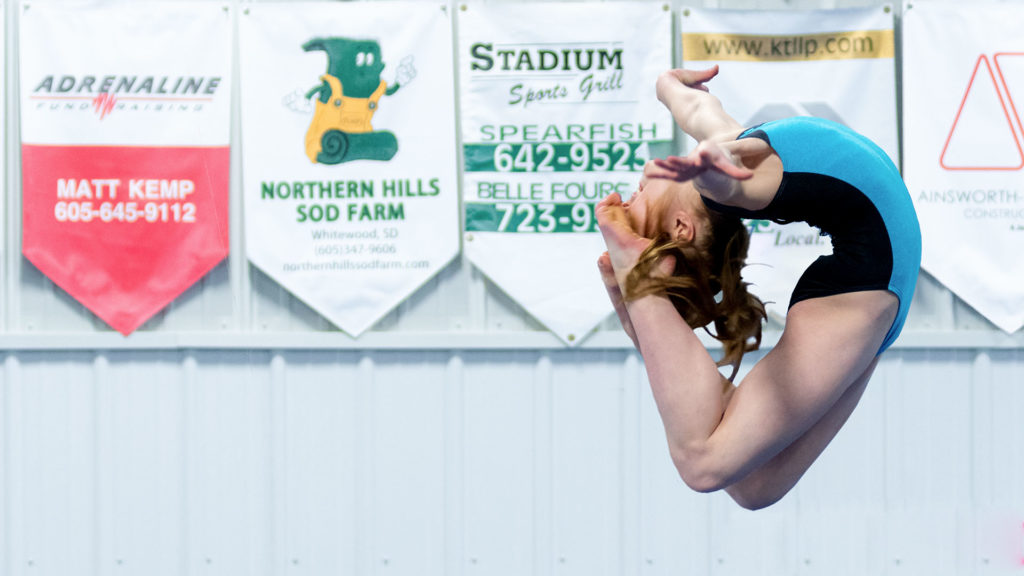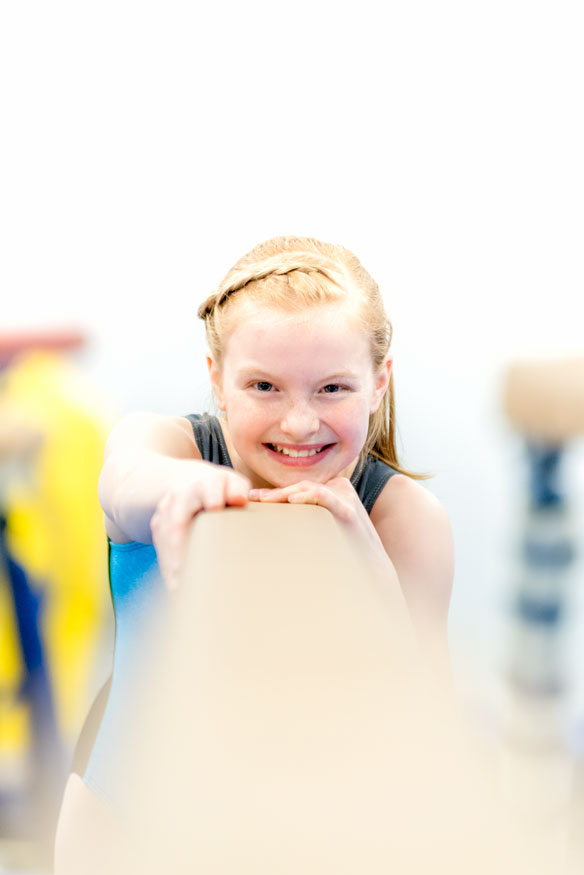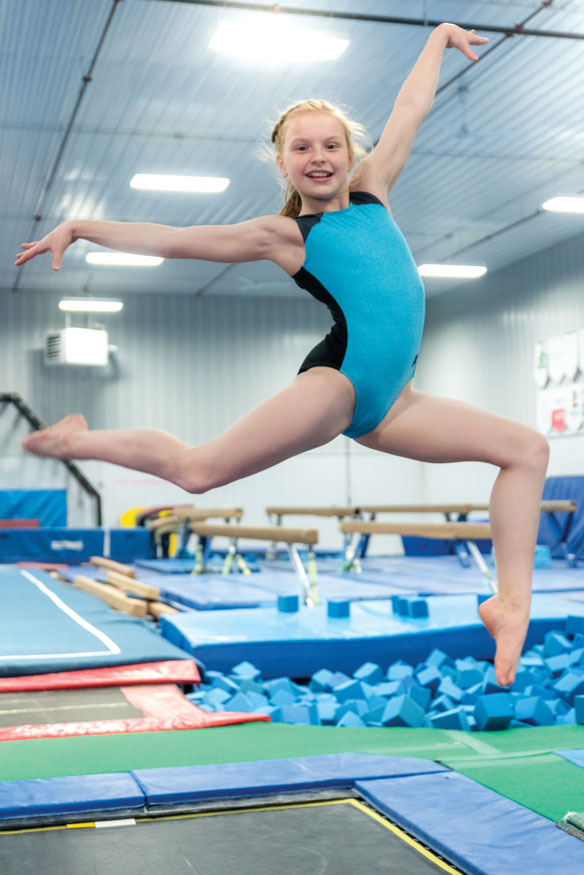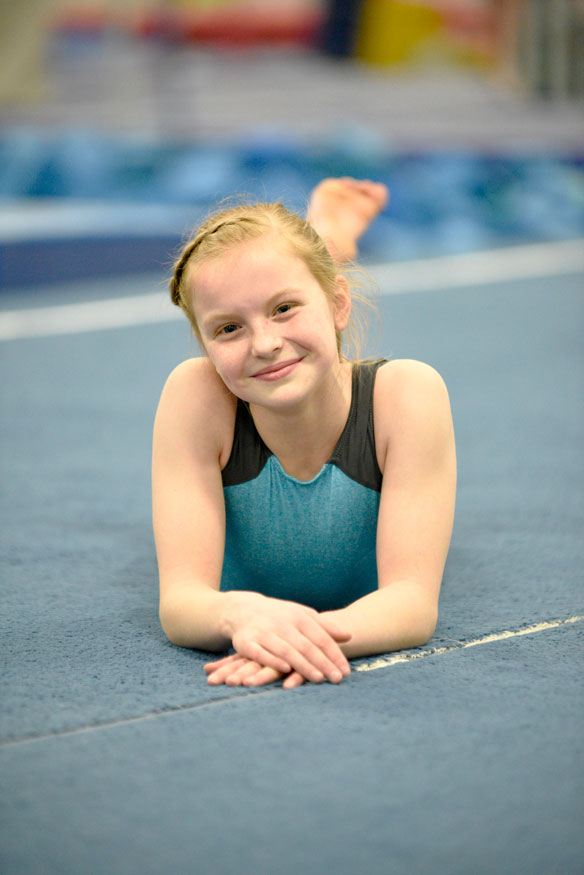“Don’t Quit on a Bad Day”
Great advice from a Spearfish gymnast who is reaching for the sky and impressing her coach and teammates.
When Ruthie Wehrung enrolled in gymnastics at the age of three, it felt as if she were fulfilling a destiny of sorts. After all, the Spearfish youth was scaling great heights by the time she was 18 months old; at an age where many children are still mastering the art of walking, she was bravely climbing up the bars of her swingset to reach the top…and she hasn’t stopped since.
“We knew she’d be in gymnastics since the very beginning,” her mom Kim says. “She was fearless, strong, and agile when she was little.”
Originally from Pennsylvania, the family moved around extensively before settling in Spearfish when Ruthie’s dad Jeff joined the faculty of Black Hills State University. Currently Chair for the School of Business and an Associate Professor of Entrepreneurship, he and Kim have been married for 18 years. At 10 years old, Ruthie is the third of seven children; her siblings, from oldest to youngest, are Paul, Daven, Lillie, Boone, Ammon, and Mae.
Ruthie is a Level 10 gymnast—the highest level you can reach in the USA Gymnastics Junior Olympics Program. While this achievement is impressive, it was her selection at age nine as the youngest gymnast in the country to be invited to attend the Junior Olympic National Championships in 2019 that really caught the attention of Chris and Phil Summers, Ruthie’s coaches and the owners of Spearfish Gymnastics Academy.
“She is an extremely talented young gymnast, but even more importantly, a great role model,” Chris says. “Her teammates look to her as an inspiration to all that is achievable in sports when you have passion, drive, and an amazing work ethic.”
For all her accomplishments, Ruthie is surprisingly humble and down-to-earth. She prefers practice to actual competitions, an indication of her strong work ethic. While she competes in all four gymnastics events—vault, bars, beams, and floor—the latter is her favorite. “You get to perform more,” she says of floor exercise. “There is a lot more variety in the routines.”
Gymnastics requires a lot of time and commitment. In addition to local home meets and bigger qualifying events for special invitationals, there is lots of out-of-state travel. Ruthie’s team regularly visits Texas, Arizona, and Colorado. Then there are regionals in Iowa and nationals in Washington state, should she qualify. Given the grueling schedule, Kim made the decision to homeschool her children.
“My biggest concern is, Ruthie is 10,” she explains. “I pulled her out of school because she would be there for eight hours, then in the gym practicing. By the time she finished homework and dinner, it was time for bed. These are her childhood years, and I want her to have fun.”
Homeschooling does provide opportunities for fun, but it’s the flexibility Kim appreciates most. Ruthie has plenty of time for gymnastics, and the family takes advantage of their frequent travel to explore local museums and historical sites, such as Gettysburg National Military Park in Pennsylvania and the National Mall in Washington, D.C. This helps foster an appreciation for culture everywhere.
Now that Ruthie has reached Level 10, performing routines equivalent to those at the collegiate level, she is contemplating her options. She could move on to the National Team (Elite group) and compete for a shot at the Olympics, or pursue college gymnastics. There are draws to both: Elite gymnastics focuses on precision routines and provides an opportunity to do something prestigious, while college gymnastics is less stressful and is beginning to emphasize fun and crowd appeal over strict form.
Ruthie may not be sure what her immediate future holds in store quite yet, but she’s already looking ahead to a possible career directly influenced by her gymnastics experience. She enjoys learning about muscles, bones, and the human body and would like to be a physical therapist for college athletes. Her skills would help others battling injury and other setbacks, rehabilitate, and return to sports.
Ruthie has a bit of advice for other aspiring young gymnasts. “Don’t quit on a bad day,” she says.
“You are going to have hard days, but you need to keep pushing through. That feeling you get when you make a skill for the first time is awesome!”
That’s a pretty good way to approach not only gymnastics, but everyday life, too.
words Mark Petruska
photos Jesse Brown Nelson
featured in the spring 2020 issue of BHParent magazine




